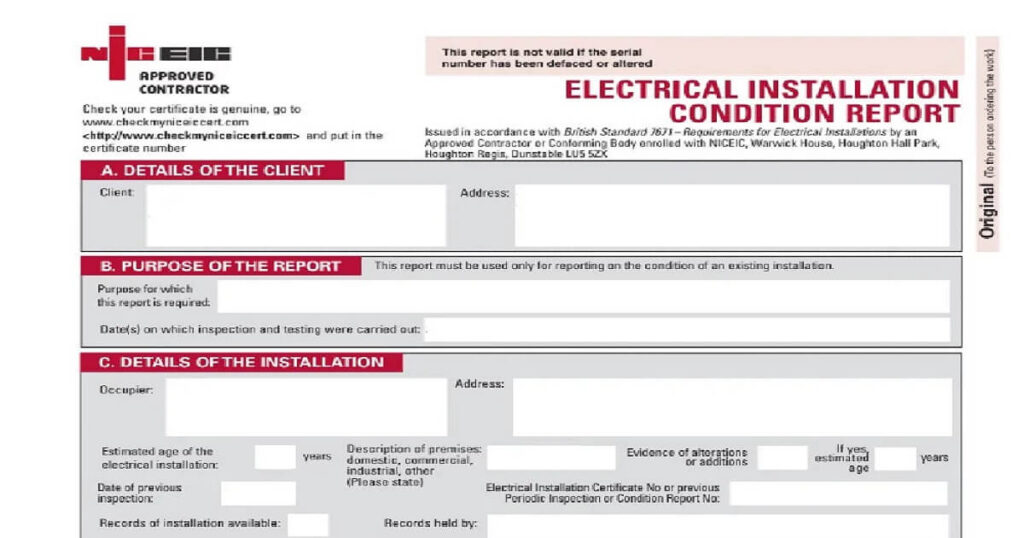A landlord isn’t violating their obligation to comply with a redressal notice if the landlord can prove they have taken the necessary steps to adhere to the notice. A landlord may demonstrate their reasonable actions by keeping copies of the communications they’ve been in contact with their tenants and electricians during their attempts to organize the work, including any responses they received. The landlord may also need to provide other documents to prove that the structure is in good order as they plan the work. This could be the Landlord Electrical Safety Certificate and any prior service reports.
Urgent Action is Required
Suppose the Landlord Electrical Safety Certificate suggests urgent actions are required, that the landlord hasn’t completed the work within the time stated in the report. In that case, the local authority could agree to undertake electrical works with the tenant’s approval. The local authority has to authorize an experienced and qualified person in writing to carry out the corrective actions and give a minimum of 48 days in warning to the tenant. The landlord may pay the cost of doing the work.
Financial penalties
Local authorities could apply a fine that could be as high as PS30,000 to landlords who fail to meet the requirements of their obligations. Can I appeal to local authorities who issue a notice or take electrical action? Or the imposing of a fine?
Yes, landlords have the right to contest the local authority’s decision. In the first instance, landlords are given 21 days to submit written requests to local authorities against notice and the intention of imposing the financial penalty. The notice of suspension is in effect until the local authorities decide on the representations. The local authority is required to notify the landlord within seven days.
Landlords have the right to appeal to the first-tier Tribunal against:
The choice to pursue actions is made by an authority local to the issue. The appeal must be made within 28 days of the date on which the electrical notice is served. After corrective action, the municipal authority submitted a claim to reimburse the costs. It is the decision to take urgent actions taken by authorities in the area. A request for appeal must be filed within 28 days of the date on which the work began.
Further questions
What happens if a tenant refuses to allow me in or I have trouble finding an inspector?
A landlord isn’t violating their obligation to comply with a Landlord Electrical Safety Certificate, if they can prove that they took the necessary steps to adhere to it. A landlord may demonstrate their reasonable steps by keeping copies of any communications they’ve exchanged with tenants and electricians while trying to organize the work, including any responses they received. The landlord may also need to prove with other documents they have to show that the building is in good working order as they plan the work. This could include the maintenance report and any previous safety report.
If an inspection was conducted and the report was satisfactory before the 18th edition, the Wiring Regulations came into force. They were less than five years ago, does a landlord have to have their property examined again once Electrical Safety Regulations come into force?
Regulation 3 stipulates that landlords must have their electrical installations inspected and tested for not more than five years. Safety standards for electrical installations (the 18th edition in the Wiring Regulations) must be maintained throughout the lease term.
The new edition 18 of the Wiring Regulations was made law in 2022. Therefore, the landlord. He already has a report on the property that was carried out before this date and has met the other requirements set out in the Regulations and has not had to undergo an inspection every five years, as long as the report doesn’t state it is the case that the following inspection has to be scheduled earlier.
Existing installations constructed under earlier editions of Wiring Regulations may not comply with the 18th edition in all aspects. It does not mean that they are not safe for use in the future or need updating.
It is a good idea for landlords with reports to examine the reports to determine if the electrical system is compliant with safety standards for electrical installations. It is also a good idea for landlords to reach out to the inspector who provided the report to verify that the installation meets the electrical safety standards.
All installations must conform to the 18th edition, whether constructed before the edition came into force. The Regulations stipulate that landlords must ensure that safety standards are adhered to and that any investigation or work be completed when the report calls for it.

The electrical system should be secure for use over time. When the report doesn’t require any electrician or investigative work, the landlord won’t be required to undertake any additional work. Landlord Electrical Safety Certificate may also recommend improvements and may also require Electrical installation condition report . Suppose a report only recommends improvement but doesn’t require any additional investigation or electrical action to be completed, which is indicated by a ‘C3’ classification code and is thought to be the best practice to conduct this work. However, it is not legally required to conform to the Regulations.
Also Read: Guidelines For Landlord Electrical Safety Certificate in London
What is the situation with newly built homes or installations?
If a house is new or was utterly rewired, it must be equipped with an Landlord Electrical Safety Certificate. The landlord can give an electronic copy of their EIC engineer to their tenants and, upon request, an authority for housing in their local area. The landlord won’t be required to conduct additional checks or submit an annual report for five years following the date the EIC is issued, as long as they’ve fulfilled their obligation or obligations in the Regulations.
What tenancies will the new Regulations apply to?
Suppose a tenant who is a private one has an entitlement to reside in an apartment as their sole or primary residence and is liable for rent and is a resident of the property. In that case, it is the Regulations that apply. This applies to assured short hold tenancies as well as licenses to be occupied.
What happens if tenancies roll over into regular Tenancies? Do they be considered an entirely new tenancy?
The question of whether a “periodic or ‘new’ tenancy is a Tenancy, as per Regulation 2.2.2, depends on the type of tenancy granted. For “contractual periodic tenancies’ ‘ – when it is stated in the tenancy agreement that the tenant’s tenure will change to a periodic once upon the expiration of the fixed period.
The Landlord Electrical Safety Certificate with a periodic term becomes part of the same contract, and no new tenancy will be added. For statutory periodic tenancies’ when at the end of the fixed term, the tenant’s tenure is converted into a periodic tenancy automatically through law (rather than contract), and the periodic tenancy is entirely new.
Apart from this, if you are interested to know about Home Security Installation Service then visit our Home Improvement category.




